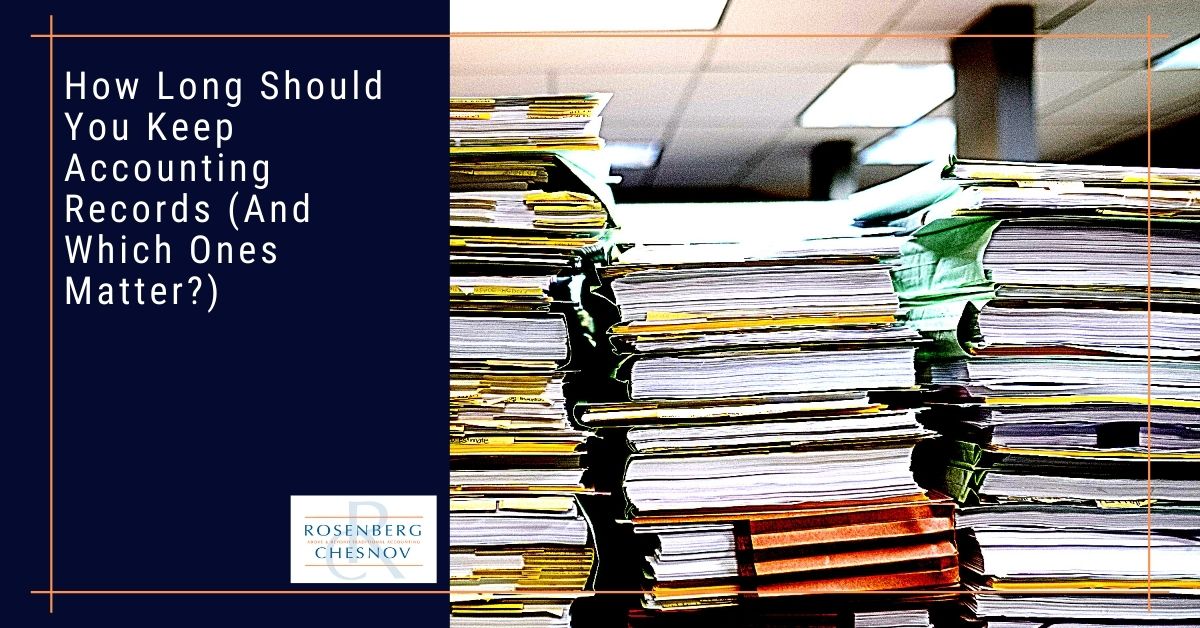

Recent Cybersecurity Breaches: 10 Critical Lessons for Companies
Category: Uncategorized
Past tax returns, statements, and financial records have a life; you should keep them as long as needed to substantiate your filings. On the other hand, there is a moment when you can let the past go and relieve yourself of expired records.
The general rule of thumb is seven years, but there are some additional details to consider, I go through those below. Please remember that this post is informational only: if you want specific advice please set up a time to talk with one of us here.
The accounting records that you should keep
This is an overview of record-keeping, not a comprehensive list. I cover the general rules below, but your specific situation may have different requirements. Use this information as a general guide.


You’ve filed and feel confident that you can prove the legitimacy of your return. You mail it and forget it. In a year, or two, or three, the IRS comes back to you and asks to verify your details.
Having your records available at the time of an audit will be a life saver!
This may seem like a no-brainer but, you’d be surprised how easy it is to forget the big picture when you’ve been focusing on the details. Also, many people rely on their tax filing software to keep records: you should keep a printed or electronic version of your tax returns. It won’t just help you deal with the IRS; it will also help you file future returns if you lose access to the software.
In addition to the return itself there are a few other documents that you should keep:
If you take the Standard Deduction you will not need to substantiate that. But itemized deductions and business expenses require documentation. These deductions can include:
Proof of payment is a receipt that documents the transaction itself. You should obtain and keep a record of every transaction between a buyer and a seller. Should the IRS come back to you, you will want to have them at your fingertips.
Proof of payment includes:
All of these will serve the purpose of cross-referencing your financial reports and tax returns.
Some situations do require specific records that you should keep for tax and legal reasons. These include (and this is not an exhaustive list):
If you pay or receive alimony, keep a copy of your written separation agreement or divorce, separate maintenance, or support decree.
This is a very common deduction and one that can require significant substantiation. Keep clear records of what part of your home you use for business and the expenses related to that use.
A common home business use is child care. If you provide child care in your home, keep track of business hours and hours spent preparing and cleaning up.
Keep detailed records of your winnings and losses. The information that the IRS requires includes:
Unfortunately, each tax credit includes special recordkeeping requirements. Examples include (and this is not an exhaustive list):
If you are claiming a tax credit, be sure to identify and retain the necessary documentation.
If you use your car for business, medical transport, or qualifying volunteer work, you will need to keep clear and accurate records of all business trips and related vehicle expenses. Read our post that explores vehicle expense deductions in more depth here.
Beyond tax, every property owner should know about “basis.” It’s the amount of your capital investment in a property for tax purposes: the higher your basis, the lower your capital gain when you sell a property. Therefore you should document the investment you’ve made to reduce your tax obligation.
There are three elements of basis:
Keep all of these records until you sell. Keeping these records will reduce the capital gains on the sale and reduce the tax you will owe.
The short answer is: it depends.
The general rule of thumb is that you should keep tax records for seven years and basis records until you sell your property. The IRS says that you must keep records for as long as the IRS may need them to administer any provision of the Internal Revenue Code.
This means that you must keep them until the statute of limitations expires.
Assuming you file on time and your tax filings are legitimate, the IRS can audit you without reason for up to three years, so you will need to keep your records for at least three years.
However, if the IRS decides that you omitted more than 25% of your gross income, the statute of limitations increases to six years.
If you file a claim for a loss from worthless securities, then the statute of limitations on an audit increases to seven years.
There is no statute of limitations on fraudulent returns or not filing returns: in this case, the IRS can require tax records for an indefinite period. So, if you are filing fraudulent returns, keep your records forever. Better yet, don’t file fraudulent returns; it is not worth it.
Luckily for everyone, the IRS acknowledges electronic records as the same as paper. Original papers can damage over time, so an electronic scan or copy is a safe bet, but only if you back it up.
Good record-keeping matters just as much in an electronic world as in a paper world. Are you, for example, still using the same laptop from seven years ago? Probably not. Be sure to keep your records safe by backing up to external hard drives, or better yet, to a cloud service.
The same rules of retention apply to electronic records as hard copy ones.
One last thought about electronic records; don’t assume an institution (like your bank or investment firm) will have your documents in seven years should you need them. Check to see what their policies dictate.
The best place to keep your records is in your computer, your drive, your cloud, or your file cabinet. Don’t rely on anyone else to retain these records for you.
In short, keep everything that substantiates your tax returns. Categorize all of your records for ease of reference. Copy everything as a backup.
Also, clean out the records you no longer need. Those tax records from twenty years ago you can probably let go (though you may want to check with a professional first, this advice is informational only.)
Unless, of course, they spark joy, in which case even Marie Kondo would encourage you to keep them.
If you are a client and would like to book a consultation, call us at +1 (212) 382-3939 or contact us here to set up a time.
If you aren’t a client, why not? We can take care of your accounting, bookkeeping, tax, and CFO needs so that you don’t have to worry about any of them. Interested? Contact us here to set up a no-obligation consultation.
Interested in receiving updates in your mailbox? Check out our newsletter, full of information you can use. It comes out once every two weeks and you can register for it here:


Category: Uncategorized
Category: Uncategorized
Category: Uncategorized
Send us a message and we will contact you as soon as possible.
Jeff Coyle, CPA, Partner of Rosenberg Chesnov, has been with the firm since 2015. He joined the firm after 20 years of business and accounting experience where he learned the value of accurate reporting, using financial information as a basis for good business decisions and the importance of accounting for management.
He is a diligent financial professional, able to manage the details and turn them into relevant business leading information. He has a strong financial background in construction, technology, consulting services and risk management. He also knows what it takes to create organizations having built teams, grown companies and designed processes for financial analysis and reporting.
His business experience includes:
Creating and preparing financial reporting, budgeting and forecasting.
Planning and preparation of GAAP and other basis financial statements.
Providing insight on financial results and providing advice based on those results.
Jeff also has a long history of helping individuals manage their taxes and plan their finances including:
Income tax planning and strategy.
Filing quarterly and annual taxes.
Audit support.
General financial and planning advice.
Prior to joining the firm in 2015, Jeff was in the private sector where he held senior financial and management positions including Controller and Chief Financial Officer. He has experience across industries, including construction, technology and professional services which gives him a deep understanding of business.
Jeff graduated from Montclair State University, he is a CPA and member of the American Institute of Certified Public Accountants, New York State Society of Certified Public Accountants and New Jersey State Society of Public Accountants.
Jody H. Chesnov, CPA, Managing Partner of Rosenberg Chesnov, has been with the firm since 2004. After a career of public accounting and general management, Jody knows the value of good financials. Clarity, decision making, and strategy all start with the facts – Jody has been revealing the facts and turning them into good business results for more than three decades.
He takes a pragmatic approach to accounting, finance and business. His work has supported many companies on their path to growth, including helping them find investors, manage scaling and overcome hurdles. His experience and passion for business reach beyond accounting and he helps businesses focus on what the numbers mean organizationally, operationally and financially.
He has a particular expertise in early-stage growth companies. His strengths lie in cutting through the noise to come up with useful, out of the box, solutions that support clients in building their businesses and realizing their larger visions.
Prior to joining the firm in 2004, Jody was in the private sector where he held senior financial and management positions including General Manager, Chief Financial Officer and Controller. He has experience across industries, which gives him a deep understanding of business.
Jody graduated with a BBA in Accounting from Baruch College, he is a CPA and member of the American Institute of Certified Public Accountants and New York State Society of Certified Public Accountants.
In addition to delivering above and beyond accounting results, Jody is a member of the NYSCPA’s Emerging Tech Entrepreneurial Committee (ETEC), Private Equity and Venture Capital Committee and Family Office Committee.
He is an angel investor through the Westchester Angels, and has served as an advisor for many startup companies and as a mentor through the Founders Institute.